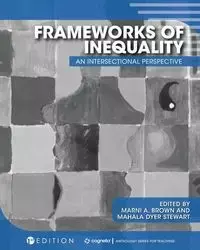Frameworks of Inequality - Marni Brown
- An Intersectional Perspective
Frameworks of Inequality: An Intersectional Perspective provides students with research-based articles that address the various ways society, institutions, and individuals experience and move through unjust practices that have been found as normative and intentional. Readers learn how systems of oppression lead to and exacerbate the way inequality impacts social experiences, especially with regard to the access (or lack thereof) afforded to particular individuals or groups.
The readings in Section 1 help to define social inequality and speak to the value of viewing issues of inequality through an intersectional framework. In Section 2, students read about how race, sexuality, and gender have been conceptualized, theorized, and applied to social life, including the ways that sociologists research social inequality. Section 3 describes the impact social inequality has in our lives. By examining institutions and interactions, the text considers how social inequalities operate within these contexts. The final section looks to the future, featuring readings on how to create positive social change. The anthology provides students with a glossary of terms and discussion questions for each reading.
Featuring scholarly, engaging content, Frameworks of Inequality is well suited for courses in sociology, especially those that explore social inequality, wealth, power, status, and social stratification.
Marni Brown is an associate professor of sociology at Georgia Gwinnett College. She holds a Ph.D. in sociology from Georgia State University, as well as a master’s certificate in women’s studies and a master’s degree in higher education from the University of Florida. Her work has appeared alongside Dr. Stewart’s in Gendered Lives and Sexual Beings: A Feminist Anthology.
Mahala Dyer Stewart is a lecturer at the University of Massachusetts, Amherst. She holds a Ph.D. in sociology from the University of Massachusetts, Amherst. Her research is primarily concerned with examining race, gender, and class inequalities through the working of families and schools. Her research has appeared in The Family Journal and Sociology Compass.
EAN: 9781516524815





